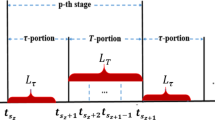Abstract
This paper studies an optimal control problem for uncertain switched linear systems with subsystems perturbed by uncertainty. A model for this problem is investigated with optimistic value criterion. The goal is to jointly design a deterministic switching law and a continuous feedback to optimize an uncertain objective function. A two-stage algorithm is applied to handle such model. In the first stage, the maximum value of the objective function and the bang–bang control are obtained under fixed switching instants, and in the second stage, GA and PSO algorithm are used to get the optimal switching instants, respectively. An example is shown to validate the method.
Similar content being viewed by others
References
Ahmad, Z., Rahmani, K., & DSouza, R. M. (2010). Applications of genetic algorithms in process planning: tool sequence selection for 2.5-axis pocket machining. Journal of Intelligent Manufacturing, 21, 461–470.
Bak, T., Bendtsen, J., & Ravn, A. (2003). Hybrid control design for a wheeled mobile robot. Hybrid Systems: Computation and Control, 2623, 50–65.
Belghith, S., Lamnabhi-Lagarrigue, F., & Rosset, M. (1986). Bang-bang solutions for a class of problems arising in thermal control. In M. Fliess & M. Hazewinkel (Eds.), Algebratic and Geometric Methods in Nonlinear Control Theory (pp. 623–632). Berlin: Springer-Verlag.
Chen, X., & Ralescu, D. A. (2013). Liu process and uncertain calculus. Journal of Uncertainty Analysis and Applications. doi:10.1186/2195-5468-1-3.
Chen, X., & Liu, B. (2010). Existence and uniqueness theorem for uncertain differential equations. Fuzzy Optimization and Decision Making, 9, 69–81.
Goldberg, D. (1989). Genetic Algorithm in Search, Optimization and Machine Learing. Boston: Addison-Wesley Longman Publishing Co., Inc.
Gao, Y. (2012). Uncertain models for single facility location problems on networks. Applied Mathematical Modelling, 36(6), 2592–2599.
Ge, X., & Zhu, Y. (2012). Existence and uniqueness theorem for uncertain delay differential equations. Journal of Computational Information Systems, 20(8), 8341–8347.
Ge, X., & Zhu, Y. (2013). A necessary condition of optimality for uncertain optimal control problem. Fuzzy Optimization and Decision Making, 12(1), 41–51.
Kamgarpour, M., & Tomlin, C. (2012). On optimal control of non-autonomous switched systems with a fixed mode sequence. Automatica, 48(6), 1177–1181.
Kennedy, J., Eberhart, R. (1995). Particle swarm optimization. Proceedings of IEEE International Conference on Neural Networks, pp. 1942–1948.
Koutsoukos, X., & Antsaklis, P. (2003). Hybrid systems: Review and recent progress. In T. Samad & G. Balas (Eds.), Software-Enabled control: Information Technologies for Dynamical Systems (pp. 273–298). New York: Wiley-IEEE Press.
Lewis, F., & Syrmos, V. (1995). Optimal Control (2nd ed.). New York: Wiley.
Li, R., Teo, K., Wong, K., & Duan, G. (2006). Control parameterization enhancing transform for optimal control of switched systems. Mathematical and Computational Modelling, 43, 1393–1403.
Lincoln, B., & Bernhardsson, B. (2002). LQR optimization of linear system switching. IEEE Transactions on Automatic Control, 47(10), 8–18.
Liu, B. (2007). Uncertainty Theory (2nd ed.). Berlin: Springer-Verlag.
Liu, B. (2008). Fuzzy process, hybrid process and uncertain process. Journal of Uncertain Systems, 2(1), 3–16.
Liu, B. (2009). Some research problems in uncertainty theory. Journal of Uncertain Systems, 3(1), 3–10.
Liu, B. (2010). Uncertainty Theory: A Branch of Mathematics for Modeling Human Uncertainty. Berlin: Springer-Verlag.
Liu, B. (2012). Why is there a need for uncertainty theory. Journal of Uncertain Systems, 6(1), 3–10.
Liu, B. (2013). Toward uncertain finance theory. Journal of Uncertainty Analysis and Application, 1, 1.
Liu, B. (2013). Polyrectangular theorem and independence of uncertain vectors. Journal of Uncertainty Analysis and Applications, 1, 9.
Liu, B. (2014). Uncertainty distribution and independence of uncertain processes. Fuzzy Optimization and Decision Making, 13(3), 259–271.
Liu, C., Gong, Z., & Feng, E. (2009). Modelling and optimal control for nonlinear multistage dynamical system of microbial fed-batch culture. Journal of Industrial and Management Optimization, 5(4), 835–850.
Luus, R., Chen, Y. (2003). Optimal switching control via direct search optimization. Proceedings of the 2003 IEEE International Symposium on Intelligent Control, pp. 302–306, Houston, Texas.
Sheng, L., & Zhu, Y. (2013). Optimistic value model of uncertain optimal control. International Journal of Uncertainty, Fuzziness and Knowledge-Based Systems, 21(suppl.1), 75–87.
Tao, N., & Zhu, Y. (2015). Attractivity and stability analysis of uncertain differential systems. International Journal of Bifurcation and Chaos, to appear.
Tomlin, C. et al. (1997). Hybrid control models of next generation air traffic management. Hybrid Systems IV, Lecture Notes in Computer Science (pp. 378–404).
Wang, C. H., & Lu, J. Z. (2010). An effective evolutionary algorithm for the practical capacitated vehicle routing problems. Journal of Intelligent Manufacturing, 21, 363–375.
Wu, C., Teo, K., Li, R., & Zhao, Y. (2006). Optimal control of switched systems with time delay. Applied Mathematics Letters, 19, 1062–1067.
Xu, X., & Antsaklis, P. (2004). Optimal control of switched systems based on parameterization of the switching instants. IEEE Transactions on Automatic Control, 49(1), 2–16.
Yao, K., Gao, J., & Gao, Y. (2013). Some stability theorems of uncertain differential equation. Fuzzy Optimization and Decision Making, 12(1), 3–13.
Yang, L., Liu, P., Li, S., Gao, Y., & Ralescu, D. (2015). Reduction methods of type-2 uncertain variables and their applications to solid transportation problem. Information Sciences, 291, 204–237.
Yao, K. (2013). Extreme values and integral of solution of uncertain differential equation. Journal of Uncertainty Analysis and Application, 1, 2.
Zhang, W., Hu, J., & Lian, J. (2010). Quadratic optimal control of switched linear stochastic systems. Systems & Control Letters, 59, 736–744.
Zhu, Y. (2010). Uncertain optimal control with application to a portfolio selection model. Cybernetics and Systems: An International Journal, 41(7), 535–547.
Zhu, Y. (2015). Uncertain fractional differential equations and an interest rate model. Mathematical Methods in the Applied Sciences. doi:10.1002/mma.3335.
Acknowledgments
This work is supported by National Natural Science Foundation of China (No. 61273009).
Author information
Authors and Affiliations
Corresponding author
Rights and permissions
About this article
Cite this article
Yan, H., Zhu, Y. Bang–bang control model with optimistic value criterion for uncertain switched systems. J Intell Manuf 28, 527–534 (2017). https://doi.org/10.1007/s10845-014-0996-2
Received:
Accepted:
Published:
Issue Date:
DOI: https://doi.org/10.1007/s10845-014-0996-2



